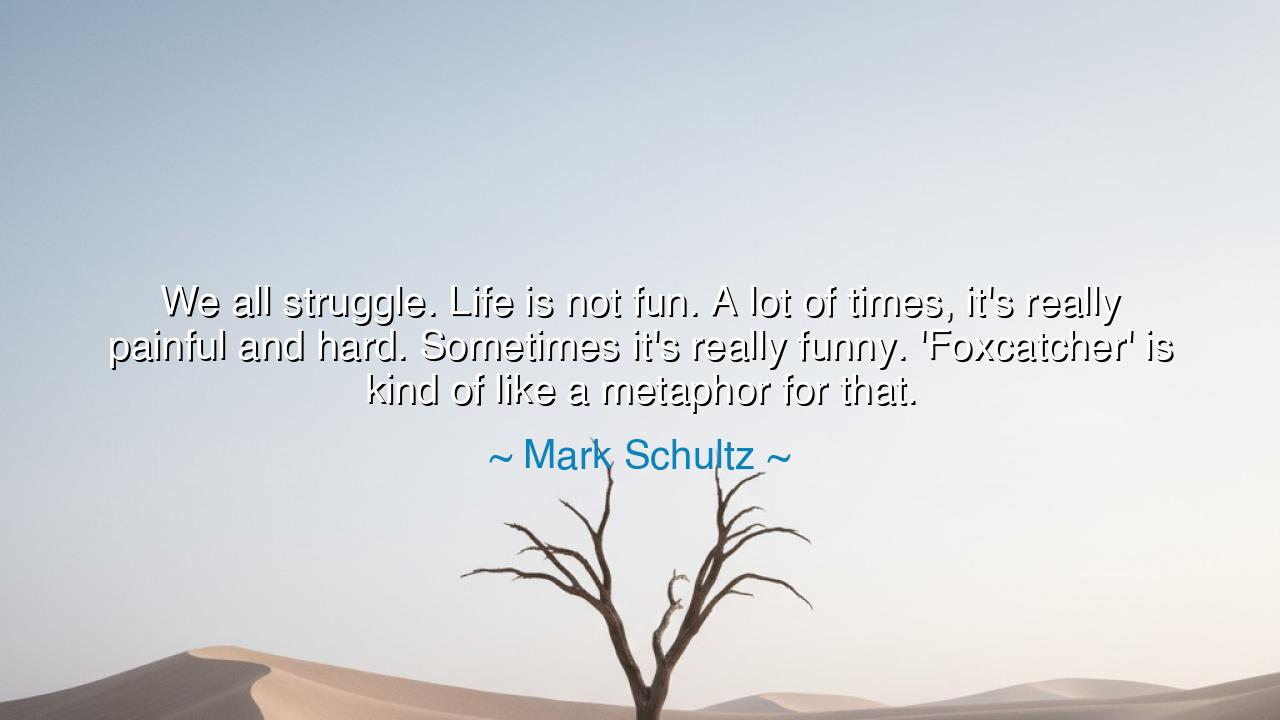
We all struggle. Life is not fun. A lot of times, it's really
We all struggle. Life is not fun. A lot of times, it's really painful and hard. Sometimes it's really funny. 'Foxcatcher' is kind of like a metaphor for that.






Hear now, O seekers of truth and endurance, the words of Mark Schultz, the warrior of the mat and the spirit, who said: “We all struggle. Life is not fun. A lot of times, it’s really painful and hard. Sometimes it’s really funny. ‘Foxcatcher’ is kind of like a metaphor for that.” In these few words, spoken by a man who lived both glory and despair, there lies a wisdom deeper than victory—a recognition of the sacred struggle that defines the human experience. Schultz, an Olympic champion and the subject of the tragic story retold in Foxcatcher, speaks not from theory but from the scars of reality. His voice is the voice of one who has fought in the arena, not only against others, but against himself, and learned that even triumph carries sorrow, and even pain may reveal strange laughter.
In the film and in life, Foxcatcher tells the story of ambition, pride, and the fragile line between greatness and destruction. Mark Schultz and his brother Dave rose from humble beginnings to the heights of Olympic wrestling, yet their journey intertwined with that of John du Pont, a man of immense wealth and dark instability. What began as a dream of unity and excellence descended into tragedy and death. Schultz’s reflection on this is not bitter—it is illuminated. When he calls Foxcatcher a metaphor for life, he means that our existence, too, is a contest of contradictions: strength and weakness, joy and suffering, hope and despair, forever entwined.
He says, “Life is not fun.” This is not cynicism—it is clarity. For to live truly is to wrestle with difficulty. The ancients called this the agon, the sacred struggle, in which every human being must prove themselves not against others, but against fate, fear, and limitation. Schultz, like the athletes of old, understands that the path of meaning is carved through resistance. It is the training ground of the soul. Life’s pain, its disappointments and humiliations, are not punishments—they are the forge where the spirit is strengthened. The laughter that comes amid such struggle, he reminds us, is not mockery but survival—the brief, shining breath between battles that keeps us human.
Consider the story of Heracles, the hero who labored through twelve impossible tasks. Each trial brought him pain, exhaustion, and loss, yet through each he grew stronger, wiser, more complete. His life was not “fun,” but it was profound. So too with Mark Schultz, and with all who dare to pursue greatness in any form. The victories we cherish—whether in sport, art, or life—are born from toil and from tears. And sometimes, amid that struggle, there appears a flash of absurdity, a dark humor that humbles us. Schultz speaks of this with quiet irony: “Sometimes it’s really funny.” For there are moments when pain and laughter become one, and in that laughter we find acceptance—the divine comedy of existence itself.
In his honesty, Schultz tears down the false idols of ease and perfection that modern life so often worships. He reminds us that struggle is universal—that no wealth, talent, or status can shield us from life’s storms. But within that truth lies freedom. For when we accept that hardship is not an exception, but the rule, we are no longer victims of it—we become participants in it. We begin to see that even our pain has purpose, and that perseverance, not pleasure, is the root of fulfillment. In this, his story becomes not just his own, but humanity’s.
Yet the heart of his wisdom is not despair—it is gratitude. When Schultz says he is grateful for the story of Foxcatcher, he does not mean he celebrates its tragedy, but that he recognizes its lesson. He has seen how even suffering can serve as a teacher, revealing what lies within. He has learned that the true measure of a person is not in how they celebrate joy, but in how they endure sorrow. Like iron hammered into form, he has been shaped by struggle into something unbreakable.
Therefore, my children of the modern age, heed the teaching of Mark Schultz: do not flee from hardship, nor measure your worth by ease. Accept that life is not always fun, but that within its trials lies the making of your soul. When you stumble, do not curse the path—rise and walk again. When you fail, laugh softly, as he did, at the strange humor of fate. Know that the world will break you only if you let it, and that every wound, when borne with courage, becomes a mark of wisdom.
For in the end, this is the lesson of Foxcatcher, and of life itself: that even amid pain, even amid loss, there exists beauty—the beauty of endurance, of resilience, of the human heart that continues to fight. And when you reach your final match, standing before the silent crowd of time, may you look back, as Mark Schultz did, and say: “Yes, it was painful. Yes, it was hard. But it was mine. And I am grateful.”






AAdministratorAdministrator
Welcome, honored guests. Please leave a comment, we will respond soon